A comeback that started auspiciously last year for Martina Hingis shuddered to a halt on Thursday, when she announced her second retirement from tennis and revealed that her decision was linked to testing positive for cocaine at this year's Wimbledon.
Hingis, a five-time Grand Slam singles champion, denied taking the drug. At a news conference in Zurich, she fought back tears and read from a prepared statement without taking questions from the gathered reporters.
"I find this accusation so horrendous, so monstrous, that I have decided to confront it head-on by talking to the press," Hingis, 27, said. "My weapon on the tennis court is and always was one single thing -- the game, the ingenuity on court. And for this style of tennis, there is only one performance enhancer -- the love of the game."
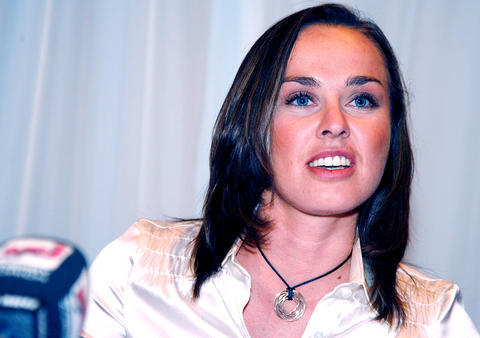
PHOTO: AP
Cocaine is banned in competition by the World Anti-Doping Code. Hingis' manager, Mario Widmer, said the positive test was administered June 29 after her loss to Laura Granville in the third round at Wimbledon.
"She [Hingis] found out in mid-September when she got a letter telling her that the A sample was positive," Widmer said in a telephone interview from Switzerland. "She was shocked."
Hingis requested that her B sample be processed and was later informed that it also had tested positive for metabolites of cocaine. She said she then hired a lawyer.
"The attorney and his experts discovered various inconsistencies with the urine sample that was taken during Wimbledon," she said in her statement. "He is also convinced that the doping officials mishandled the process and would not be able to prove that the urine that was tested for cocaine actually came from me. However, this attorney and others have also pointed out to me that a case like this one can sometimes take years to resolve, especially if both sides repeatedly appeal the case and take it to the next level. And this is the reason for my announcement. I have no desire to spend the next several years of my life reduced to fighting against the doping officials."
Hingis said her decision to retire was also linked to ongoing physical problems, particularly the chronic hip pain that has contributed to her disappointing season this year.
Last year, when Hingis returned to the tour full time after nearly a three-year break, she looked supremely fit and quickly reasserted herself. She reached the quarter-finals at the Australian Open and the French Open, finished the year ranked No. 7 and earned the WTA's Comeback Player of the Year award.
She peaked at the No. 6 ranking early this year after reaching the quarter-finals at the Australian Open again and then winning a high-level tour event in Tokyo in February. She missed the French Open because of her hip problems and dropped out of the top 10, failing to advance past the quarter-finals in any event since Tokyo. She is ranked 19th this week.
"The fact is that it is more and more difficult for me, physically, to keep playing at the top of the game," Hingis said in her statement. "And frankly, accusations such as these don't exactly provide me with motivation to even make another attempt to do so. I'm now 27 years old, and realistically too old to play top class tennis."
Her period of dominance was brilliant yet brief. She won all five of her Grand Slam singles titles in a two-year span between January 1997 and January 1999, and she served as a transitional figure between the eras of Steffi Graf and of Venus and Serena Williams.
Her best results came at the Australian Open, where she won in 1997, 1998 and 1999, and reached the final for three consecutive years after that. She won Wimbledon and the US Open in 1997, the year she became the youngest player to reach No. 1, at 16 years, six months and one day.
Hingis has yet to win another major singles title. She left the game in early 2003 because of foot problems and slumping results. Now, it appears that she has left the game for good.
"I believe her when she says she's retiring permanently," said Larry Scott, the chairman and chief executive of the WTA.
Regarding the drug case, Scott emphasized that he wanted to "presume Martina's innocence until she goes through a process."
This is the first year that professional tennis has a unified anti-doping program, which is being administered by the International Tennis Federation. The policy prohibits the federation from confirming or denying the existence of a doping case until an official ruling has been made.
Hingis' retirement would not stop the federation from pursuing the matter to its conclusion, which could include a two-year suspension from the game and the repayment of some of her prize money.
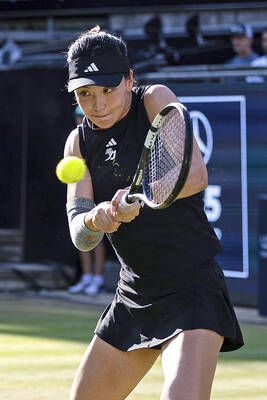
Twelve days after winning her second Grand Slam title at the French Open, Coco Gauff fell at the first hurdle on grass in Berlin on Thursday as beaten Paris finalist Aryna Sabalenka advanced to the quarter-finals. Recipient of a first round bye, American Gauff lost 6-3, 6-3 to Chinese qualifier Wang Xinyu as world number one Sabalenka beat Rebeka Masarova 6-2, 7-6 (8/6) in her second round tie. Winner of 10 main tour titles, including the US Open in 2023 and the WTA Finals last year, Gauff has yet to lift a trophy in a grass-court tournament. “After I won the first
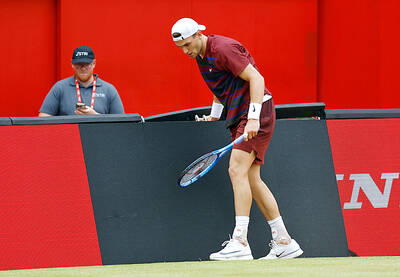
While British star Jack Draper spent the past week trying to find rhythm and comfort in his first grass tournament of the season at the Queen’s Club Championships in London, Jiri Lehecka on Saturday bulldozed everything in his path. After more than two furious hours of battle, their form was reflected in the final scoreline as Lehecka toppled a frustrated Draper, the second seed, 6-4, 4-6, 7-5 to reach the biggest final of his career, against Carlos Alcaraz. Lehecka is also the first Czech to reach the men’s title match at Queen’s since Ivan Lendl lifted the trophy in 1990. Draper, who
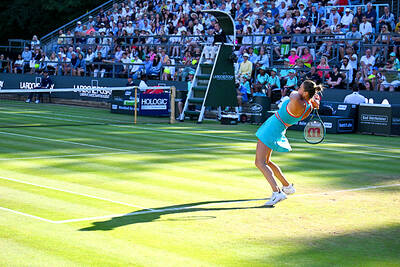
Top-ranked Aryna Sabalenka staged a “crazy comeback,” saving four match points before beating Elena Rybakina 7-6 (6), 3-6, 7-6 (6) in the quarter-finals of the Berlin Open on Friday. Sabalenka was 6-2 down in the final-set tie-breaker, but won six straight points to reach her eighth semi-final of the season. “Elena is a great player and we’ve had a lot of tough battles,” Sabalenka said. “I have no idea how I was able to win those last points. I think I just got lucky.” “I remember a long time ago when I was just starting, I won a lot of matches being down
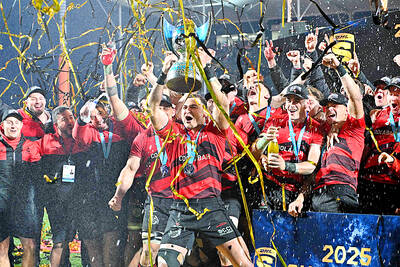
The Canterbury Crusaders edged the Waikato Chiefs 16-12 in an intense Super Rugby Pacific final battle in Christchurch yesterday to claim their 15th title in 30 years of the Southern Hemisphere competition. Hooker Codie Taylor scored a try and Rivez Reihana contributed 11 points from the kicking tee as the most dominant team in Super Rugby history extended their perfect home playoff record to 32 successive matches since 1998. The Chiefs, who were looking for a first title since 2013, scored first-half tries through George Dyer and Shaun Stevenson, but were unable to register a point after the break and fell to